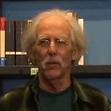Free Speech Roundtable Sunday Discussion
This Sunday brought�� a little bit different offering from the Bloomington Writers Guild (cf. February 1, et al.).�� Rather than poetry or prose per se., or open mike readings, today had a group of eight or ten writers discussing the questions of censorship and even, perhaps, the duty of writers.�� ���Since the CHARLIE HEBDO attack,��� the description began, ���questions have surfaced once again about free speech, censorship, self-censorship, and the possible consequences of putting words into print.�� . . . the meaning of free speech, its effect (both good and bad), and how it may affect our lives and future.���
There were no answers, just an informal chat for about an hour at a local coffeehouse.�� Quotes from writers were passed around, which we read in turn, as a sort of warming up session — mine, for instance, from Salman Rushdie, ended ���To read a 600-page novel and then say it has deeply offended you:�� well, you have done a lot of work to be offended��� — these in turn leading to questions, in this case perhaps whether there are times when a writer should seek deliberately to offend.�� There might be, for instance, as in the case of CHARLIE HEBDO, a time when one should take an especially ���in your face��� position as a way to force conversation about things people may be deliberately trying to ignore.�� But there could be dangers, too, as we learned in the case of CHARLIE HEBDO.
One thing pointed out, is that the danger of silencing need not always be in the headlines.�� Social pressure to prevent speaking out at a school board meeting against censorship of biology texts on evolution, for instance, may in its combined effect across multiple communities be even more dangerous in the long run than armed thug attacks against a single ���offending��� high-profile publication.�� But everything ends up, still, to a matter of individual circumstances and contexts and, ultimately, the writer���s individual decisions.�� As a horror writer in my own experience I don���t go out seeking windmills to tilt at, but in certain stories I do feel it���s needed to go in some depth�� into what lies beneath, and causes, the horror (in choosing stories for THE TEARS OF ISIS, as one example, I realized perhaps for the first time — though this time in terms of parallels between 1950s cold war paranoia and present day Islamophobia — how powerful the story ���Bottles��� may be especially now, as well as possibly understanding why the mystery magazine I���d originally written it for may have decided to turn it down even forty years after the time of the story).
In any event, it���s something to think about.�� Do I self-censor?�� Of course I do sometimes — even in horror there is such a thing as taste.�� But other times I might not, and at yet other times what I think a story might need is an extra twist taking it at a tangent from where it started (in THE TEARS OF ISIS perhaps in the reprint ���The Christmas Rat,��� or maybe ���Bones, Bones, the Musical Fruit���?�� Though others who read them may disagree).
Be true to one���s self, is that the message?�� I think so, maybe, but also to study who you yourself are.�� Be sure it is true, and be mindful of editors or, even if self-publishing, a need to attract readers to your words if they���re worth reading.�� Or does that start going around in circles?
To close, another quote I drew to read, this one from 1960s activist Abbie Hoffman:�� ���Free speech is the right to shout ���Theater!’ in a crowded fire.���




